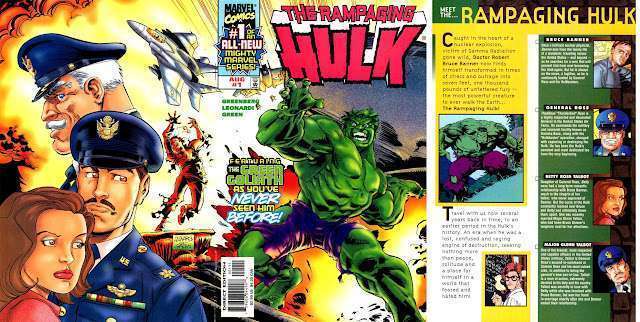Nestled in between the 2nd volume of Fantastic Hulk and its 1999 successor, Hulk (renamed in 2000 after eleven points to Fantastic Hulk), modified into as soon as the six-dispute series Rampaging Hulk published at some stage in 1998-ninety 9, recycling the title of the unhurried ’70s magazine and promising an outline of the Hulk “as you’ve got never viewed him earlier than!“
Yet, as this main dispute’s introductory data has alluded to, this Hulk genuinely will ring very familiar to those readers of his prior series who effectively undergo in mind the “Hulk break!” behemoth who leaped all the perfect draw by the Unusual Mexico barren method and clashed with the militia forces stationed at Gamma Noxious. Nor does that heinous’s C.O., Gen. Thaddeus “Thunderbolt” Ross, seem all that different to us as he and his 2nd-in-drawl, Maj. Glenn Talbot, prep what we presume to be heaps of most up-to-date heinous recruits on their installation’s mission, so treasure that of the customary Project Greenskin.
Though with his antipathy toward Bruce Banner, Talbot clearly just will not be excited by following the Current’s lead and highlighting the Hulk as a probability for scientific advancement nonetheless, slightly, a foul creature and probability to the human bustle that must be handled.
We learn on the splash page(s) that what we’re seeing occurred almost six years prior, which would were within the early ’90s (our time) when Peter David modified into as soon as writing the ebook. But given that the dispute establishes a marker of kinds that indicates the recent marriage of Talbot and the Current’s daughter, Betty, that can typically put us circa 1973–excluding for the reality that the Current is relating to his militia installation as Gamma Noxious, which wasn’t formally commissioned as such till 1976.
And since the Current’s mission assertion for the time being referring to the heinous’s cause mirrors his phrases from his briefing, we’re left to convey that this series takes method within the future after Talbot’s comatose mind (courtesy of the Gremlin) modified into as soon as returned to consciousness in dispute #200 in mid-’76–a prelude, unfortunately, to sadder days, since Talbot and Betty were headed for divorce three years later.
As for Betty, it is not easy to dispute right here whether or not Talbot’s fears about his partner’s staunch feelings are justified. Regardless, we’re maybe seeing indicators of the man that Colonel Talbot will at closing change into when he would later rob regulate of Gamma Noxious and whisk after the Hulk in earnest, in portion attributable to referring to his previous with Betty as “a lifetime of loneliness and wasted memories” attributable to Bruce Banner.
And what of Banner? Taking a janitorial method on the Assign Company (you sure can pick ‘em, Doc), he all but again works toward a you can consider cure for himself, at the same time as it is clear he fumes at Talbot in worthy the identical method because the Most most vital does toward himself, although with the distinction that Betty is now Talbot’s partner. But all of that takes a assist seat when the draw he conducts on himself takes a flip for the worse. (And boy, we are able to express that about Bruce Banner a lot. There is a publish in there someplace.)
The scene carries annoying undertones of a 1985 memoir by Bill Mantlo and Mike Mignola which detailed Banner’s pent-up madden as a child attributable to his remedy by his father–right here, seeming to stamp clear that their relationship, and Banner’s helplessness at some stage in, stays the cause that the Hulk “hates Banner.”
Here and now, although, Banner realizes that he has the probability to stamp a stand of a sure type–a probability to at closing take regulate, assuming his physical physique can stand the strain of such an inner fight. To those on the exterior, this form of fight is touch and whisk, by all appearances–while for Banner, who regarded so optimistic, it becomes clear that the rage of the Hulk, as within the waking world, can not be denied, or contained.
With the Hulk’s ascendance, Ross stays defiant within the face of his captive’s rage, telling the monster in no unsafe terms that this time there will be no damage out for him from the verbalize-of-the-work containment cell he’s imprisoned in–another example of Ross’s steadfast belief within the militia’s superior would maybe maybe maybe over that of the Hulk, an obsessive frame of mind which is portion of what makes Ross this form of inaccurate but compelling personality, even when in hindsight all people is aware of this is able to maybe also consequence in him committing treason down the freeway.
Over all but again, on the opposite hand, the Hulk’s jailers reckon without his prodigious strength in the case of his increasing madden. In response, Ross’s response is unfortunately predictable–nonetheless for the Hulk, and especially for the trapped Bruce Banner, creator Glenn Greenberg ends the dispute more poignantly.
With this being earlier than the time when Shock would convey nothing of limiting a brand recent series to a receive 22 situation form of points earlier than pulling the gallop and starting another such bustle with most effective a tweak to the masthead, it modified into as soon as life like to evaluate that Rampaging Hulk would bear some measure of success on the comics stands, even constricted to being “stuck within the previous” because the asserting goes–but in its sixth dispute, most effective a quilt caption and an unceremonious blurb within the dispute’s letters page marked the reality that the series had ended. The unlock of the recent Hulk series three months after Rampaging‘s cancellation, on the opposite hand, made it clear that this man-monster, even in print, modified into as soon as certainly unstoppable.










